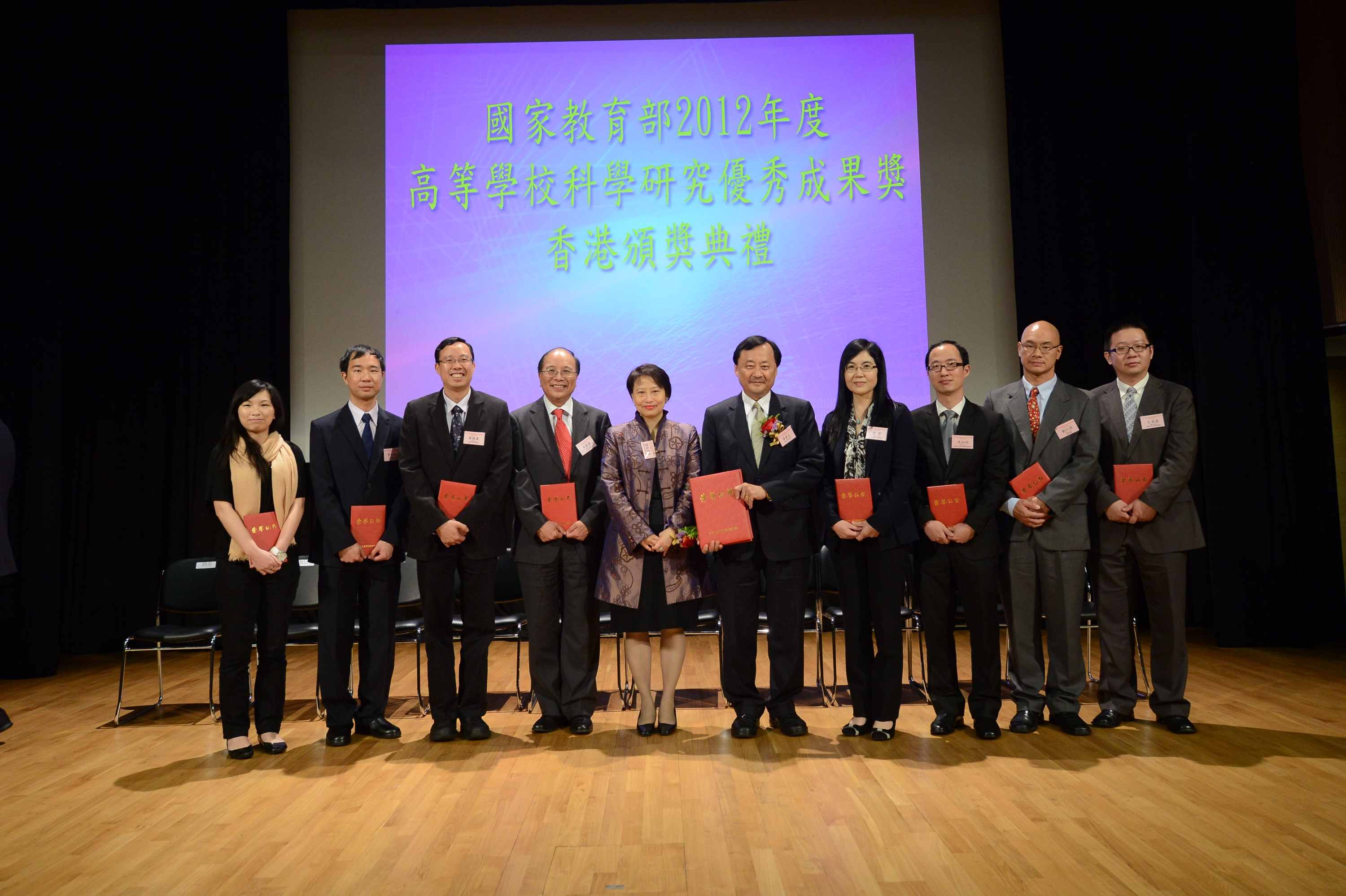The Chinese University of Hong Kong (CUHK) received four Higher Education Outstanding Scientific Research Output Awards (Science and Technology) from the Ministry of Education (MoE) in 2012, including one first-class award in Scientific and Technological Progress, and three second-class awards in Natural Sciences, making it the institution receiving the highest number of awards in the local tertiary sector. The award presentation ceremony was held today (16 May) at the Lecture Theatre of Shaw College, CUHK. Dr. Du Zhanyuan, Vice-Minister of Education was invited to Hong Kong as the prize presenter.
The CUHK professors who have received the first-class award in Scientific and Technological Progress are: Prof. Joseph J.Y. Sung, Vice-Chancellor and Mok Hing Yiu Professor of Medicine; Prof. Henry L.K. Chan, Professor, Department of Medicine and Therapeutics, and Director, Institute of Digestive Disease; Prof. Jun Yu and Prof. Vincent W.S. Wong, Professors, Department of Medicine and Therapeutics. Professors who have received second-class awards in Natural Sciences are: Prof. Ka-hou Chu, Professor, School of Life Sciences; Prof. Renbao Liu, Associate Professor, Department of Physics; Prof. Yixiang Wang, Associate Professor, Department of Imaging and Interventional Radiology; Prof. Charlie C.L. Wang, Associate Professor, Department of Mechanical and Automation Engineering.
First-class award in Scientific and Technological Progress – Investigation and Application of Pathogenesis and Intervention for Non-alcoholic Fatty Liver Disease
The research was led by Prof. Jun Yu, Prof. Vincent W.S. Wong, Prof. Henry L.K. Chan and Prof. Joseph J.Y. Sung, with collaboration of 302 Military Hospital of China. Non-alcoholic fatty liver disease (NAFLD) is the most common chronic liver disease. It includes a wide disease spectrum from non-alcoholic fatty liver to non-alcoholic steatohepatitis (NASH), which can further develop to liver cirrhosis and liver cancer. During the past 15 years, the Institute of Digestive Diseaseat CUHK and 302 Military Hospital of China jointly conducted the integrative and in-depth research on this disease. Researches have been focused on the natural history of human NAFLD, molecular mechanism of NAFLD pathogenesis, and the evaluation and intervention of disease progression, which have led to an important basic and clinical significance. The researchers are also the first to report the relationship of NASH to colorectal cancer. Findings of this research have been included in 5 practice guidelines of NAFLD; a total of 74 research articles have been published in peer-reviewed journals with citation rate over 500 times.
Second-class award in Natural Sciences – Theory of microscopic mechanisms of electron spin decoherence, coherence protection and applications
The superpower of quantum computing stems from the superposition principle in quantum mechanics. Quantum computing is tricky because quantum superposition, i.e., coherence is fragile due to unavoidable coupling to environments. For years, the research group led by Prof. Renbao Liu has developed a series of theories to understand and control the coherence loss of electron spins in solids, which have received experimental confirmation in a wide range of quantum systems. Their work led to the first experimental demonstration of coherence preservation in a realistic solid-state system, which has been selected into the Top Ten Progresses of Science and Technology in China 2009 by academicians of Chinese Academy of Sciences and Chinese Academy of Engineering. As remarked by American physicists Buckley and Awschalom in Nature – News & Views, ‘these achievements are vital to pushing the performance of real, physical systems closer to that required for practical quantum computing’. The researchers also proposed a scheme of exploiting the protected quantum coherence for atomic scale magnetometry and single-molecule NMR, which are the crown-jewel challenge in magnetic resonance spectroscopy research.
Second-class award in Natural Sciences – Molecular systematics of decapod crustaceans
In the past, decapod crustacean phylogenetics and classification were mainly based on morphology. However, because of the complex and versatile exoskeleton, there have been many controversies in defining species as well as higher taxa. The research team led by Prof. Ka-hou Chu used molecular biology analysis to study decapod crustacean systematics. They completed a comprehensive phylogenetic analysis of the commercially important penaeid shrimp, and the phylogenetic and population differentiation study of the Chinese mitten crab and its closely-related species. The controversies concerning the species classification and differentiation, population diversification and natural hybridization have been resolved. These results have important implications in aquaculture development and conservation. Moverover, several nuclear protein-coding gene markers for decapod phylogenetics were developed to elucidate the phylogenetic relationships among major groups of decapods. These molecular markers are now widely used by colleagues worldwide, making CUHK leader in this field of study. A total of 43 SCI papers were published from this study, with a total citation of over 500. Professor Chu received the Research Excellence Award from CUHK in 2007-08, while postgraduate students in his research team have won several scholarships as well as best paper awards in international and local conferences.
Second-class award in Natural Sciences – The Safety Study of Islet Xenotransplantation
Diabetes mellitus is one of the most common chronic diseases which affect the human well-being. Pancreas islet transplantation is an effective treatment; however, the lack of human pancreas islet donor is a major obstacle, thus xenotransplantation is explored as a solution to this. This collaborative research project conducted by Prof. Yixiang Wang of CUHK and researchers from Central South University and Wuhan Institute of Virology, Chinese Academy of Sciences systemically investigated the safety of pancreas islet xenotransplantation (pig to human), including infection, choice of surgical operations, immune-rejection, risk assessment, ancillary drug treatments and so on. This study laid down the foundation for cultivating xenotransplantation donor pigs. The results will be applicable for effective antivirus treatment, lowering the risk of post xenotransplantation infection, and raising the safety of pancreas islet xenotransplantation.
About Higher Education Outstanding Scientific Research Output Awards
The Higher Education Outstanding Scientific Research Output Awards (Science and Technology) is set up by the MoE to recognize outstanding research projects at all tertiary institutions in mainland China. Since 2009, Hong Kong’s tertiary institutions have been included in the scheme. The award is presented to individuals or units who have made remarkable contributions in the areas of scientific discovery, technological innovation, science and technology advancement and implementation of patented technologies. The Natural Sciences Award honours researchers who have made discoveries in natural science and applied science, or given explanations to natural phenomena and characteristics; the Technology Advancement Award honours research achievements in applied technologies of natural science.









